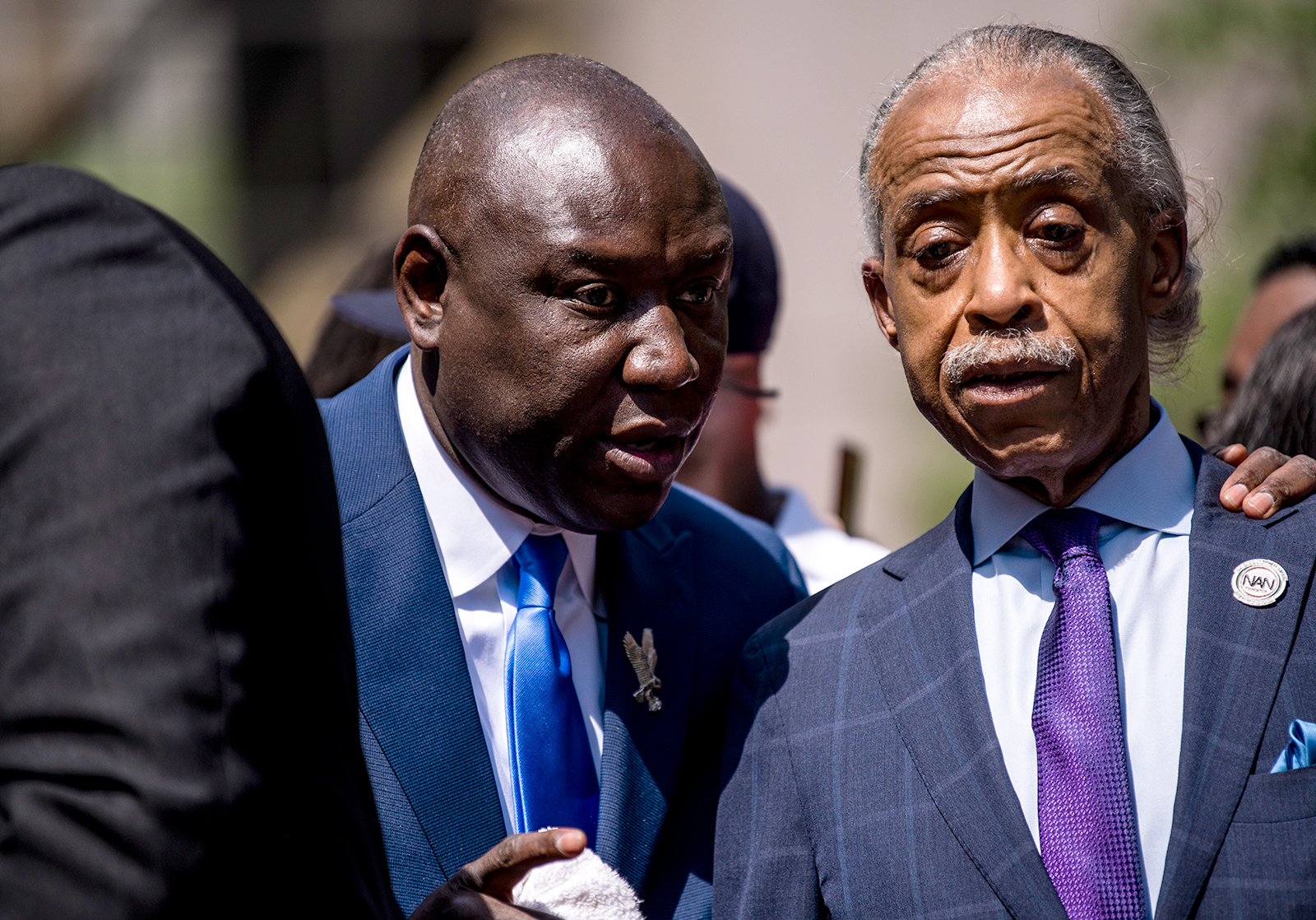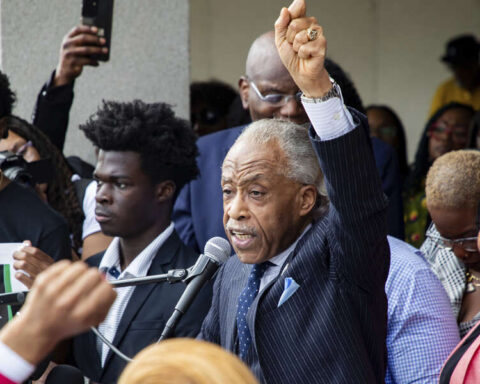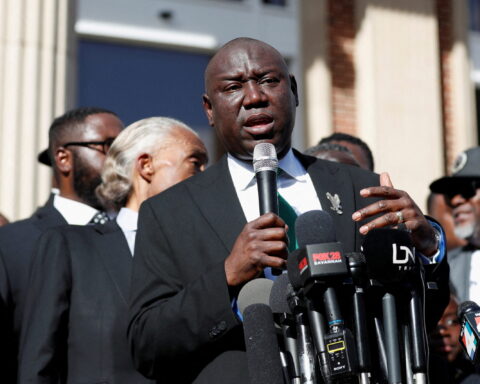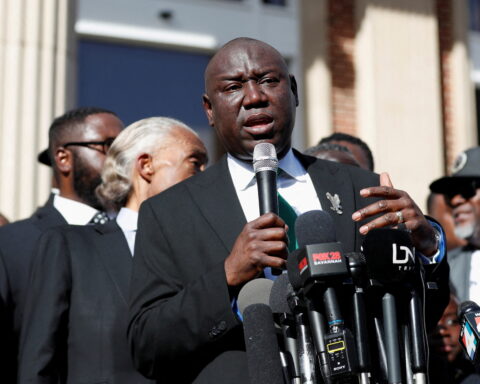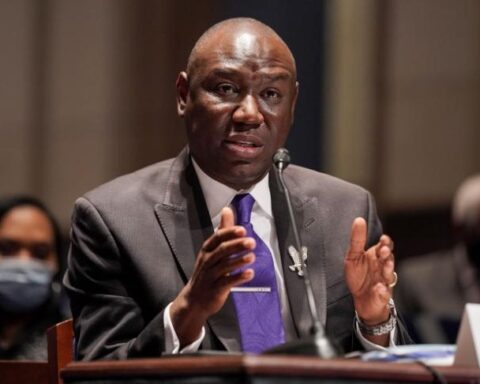The Rev. Al Sharpton and Ben Crump are taking up their first case involving a White person who was killed after being shot during an encounter with a police officer.
The civil rights leader and the high-profile attorney, who Sharpton has dubbed “Black America’s Attorney general,” deemed the police shooting of 17-year-old Hunter Brittain “one of the most significant” cases in the fight to push Congress for landmark police reform legislation.
Attorneys Crump and Devon Jacob, along with Sharpton and representatives from the NAACP, were invited to attend Brittain’s memorial on Tuesday at Beebe High School in Beebe, Arkansas.
Brittain was fatally shot June 23 by a Lonoke County sheriff’s deputy during a traffic stop around 3 a.m. outside of a local auto repair shop along Arkansas Highway 89 south of Cabot, a Little Rock suburb, according to Arkansas State Police.
Brittain was taken to a North Little Rock hospital where he later died, state police said.
Later that day, the sheriff’s office identified the deputy in a post on its Facebook page as Sgt. Michael Davis and said he’d be placed on administrative leave pending the outcome of the police investigation.
Eight days later, on July 1, Lonoke County Sheriff John Staley announced he’d fired Davis because the deputy didn’t “activate his body camera in a timely way” during the traffic stop, in violation of department policy.
As a result, no footage of the shooting exists, Staley said in a video statement posted on his office’s Facebook page.
Crump says case could increase support for policing act
Crump told CNN on Friday that he believes Brittain’s death could push lawmakers to pass the George Floyd Justice in Policing Act, which has stalled in the Senate since early March as bipartisan negotiators attempt to reach a compromise on several key sticking points.
The attorney has represented the families of Breonna Taylor, George Floyd, Michael Brown and several other Black people who were fatally shot by police.
But Crump said the image of an unarmed, White teenager killed by police will start to change the narrative as the country sees that children of all races and ethnicities can be victims of police violence.
“That is going to be looked at differently because he wasn’t a teenager who was a child of color,” Crump said. “Because we’ve always said that our White brothers and sisters couldn’t fathom their child being killed by the police. That people are supposed to protect them. But that’s a reality that parents of children of color literally deal with every day of their lives.”
In his eulogy, Sharpton said, “The issue of policing is not about Black and White. It’s about right and wrong.”
Sharpton said this was the first time in his nearly 40-year career advocating for civil rights that he was invited to present the eulogy for a White person who was a victim of police brutality.
Brittain’s death has sparked protests outside the sheriff’s office, as well as a proposal for a so-called “Hunter’s Law” in the state.
A petition calling for officers and sheriff’s deputies to wear and activate body-worn cameras during their entire shift has already garnered thousands of signatures.
The George Floyd Act also contains a provision requiring body cameras and calls on federal law enforcement officers to activate them when responding to calls or initiating a stop “at the first reasonable opportunity to do so.”
Here’s what Brittain’s family and attorneys say happened
Brittain was driving home with a friend when Davis pulled him over, according to Sharpton, who relayed the information from Brittain’s grandmother.
Brittain’s car would not shift into park, so he stepped out of the vehicle to put a “large bright blue plastic bottle” of antifreeze behind the tire to prevent it from rolling backward toward the deputy’s vehicle, according to a statement released Friday by Crump and Jacob.
Davis then shot Brittain three times, the statement says.
Jordan King, 16, told CNN affiliate KATV he witnessed the shooting. King said he and Brittain had been changing the transmission in Brittain’s truck at the auto body shop.
When they left, King told KATV, Davis pulled them over and Brittain placed a blue oil jug behind the truck’s tires to “stop it from hitting Davis’ car.”
King said the sheriff’s deputy then fired his gun, “without telling Brittain to stop or get on the ground,” adding that his friend was unarmed.
“They didn’t say one word that I know of. I didn’t hear it and it happened so fast,” King told KATV.
Another officer then arrived at the scene and arrested him, King said.
“(He) told me get out with my hands up and pull my shirt up and stuff, and then took me to the ground, put me in handcuffs and was dragging me around and stuff. And then I sat in the back of the cop car for about three hours,” he added.
Jesse Brittain, the teenager’s uncle who also spoke at the memorial, told CNN on “Don Lemon Tonight” Thursday that the police have “not released one single thing to us,” saying the family is “looking for answers.”
The Lonoke County Sheriff’s Office and the Arkansas Sheriffs’ Association did not respond to a request for comment from CNN to confirm details about the incident laid out in the attorneys’ statement.
The sheriff’s office handed over the investigation to state police, which gave its findings to Lonoke County Prosecuting Attorney Chuck Graham on Friday, he confirmed to CNN. Graham said a special prosecutor would be assigned to the case.
Prosecutor Coordinator Bob McMahan told CNN on Saturday that he expects to appoint a special prosecutor as soon as Monday and said the investigation is ongoing.
“Body cameras are, in the overwhelming majority of cases, the only way to see the unbiased facts surrounding a police and civilian encounter resulting in injury and/or death,” according to the statement from Crump and Jacob. “When officers turn their body cameras off, they turn off their intent to be transparent along with it.”
156 White people, 102 Black people killed by police this year, group says
Since January, 156 White people and 102 Black people have been killed by police, according to Mapping Police Violence, a database that collects data on police killings. That includes 14 unarmed White people and six Black people killed by police this year, according to the data. The database includes the number of off-duty police killings as well as incidents where police kill someone “through use of a chokehold, baton, taser or other means,” their website states.
Black people, who make up roughly 14% of the US population are three times more likely to be killed by police than White people, who account for 76% of the country’s population, according to data from Mapping Police Violence.
Crump, who has previously represented White inmates who were killed or died while incarcerated, said he had to “help give his (Brittain’s) family the voice to say Hunter Brittain’s life mattered.”
“I want to be able to talk to senators on both sides of the aisle and say, ‘This isn’t just about Black children, it’s also about brown children and White children and Asian children,'” Crump said. “This is about our citizens being brutalized or killed because the federal government hasn’t acted.”
Sharpton said he didn’t know what to expect when he arrived in Arkansas for Brittain’s memorial, but knew he had to “take the risk” knowing that it was a significant moment.
“I think it may have been (300) or 400 people there, maybe 20 Black, and for them to give me five or six standing ovations showed that this is a real possibility of us bridging, a real police accountability movement that is based on race, and class,” Sharpton said, adding, “As I said in the eulogy, that if Hunter had been a rich guy in another part of the White community, would they have shot him like that?”
